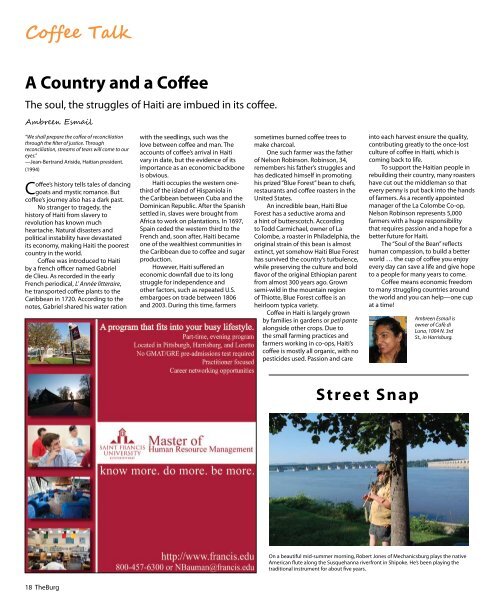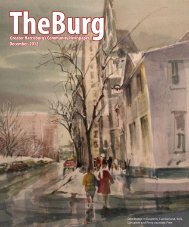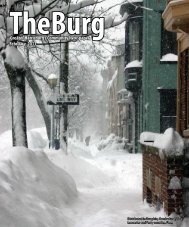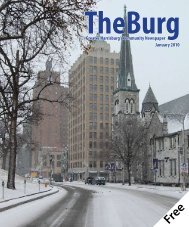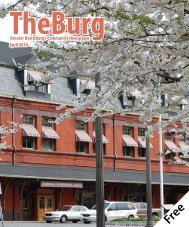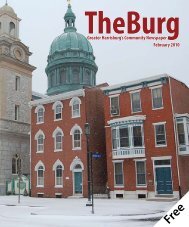August 2011 Greater Harrisburg's Community Newspaper - theBurg
August 2011 Greater Harrisburg's Community Newspaper - theBurg
August 2011 Greater Harrisburg's Community Newspaper - theBurg
Create successful ePaper yourself
Turn your PDF publications into a flip-book with our unique Google optimized e-Paper software.
Coffee Talk<br />
A Country and a Coffee<br />
The soul, the struggles of Haiti are imbued in its coffee.<br />
Ambreen Esmail<br />
“We shall prepare the coffee of reconciliation<br />
through the filter of justice. Through<br />
reconciliation, streams of tears will come to our<br />
eyes.”<br />
—Jean-Bertrand Ariside, Haitian president.<br />
(1994)<br />
Coffee’s history tells tales of dancing<br />
goats and mystic romance. But<br />
coffee’s journey also has a dark past.<br />
No stranger to tragedy, the<br />
history of Haiti from slavery to<br />
revolution has known much<br />
heartache. Natural disasters and<br />
political instability have devastated<br />
its economy, making Haiti the poorest<br />
country in the world.<br />
Coffee was introduced to Haiti<br />
by a french officer named Gabriel<br />
de Clieu. As recorded in the early<br />
French periodical, L’ Année litteraire,<br />
he transported coffee plants to the<br />
Caribbean in 1720. According to the<br />
notes, Gabriel shared his water ration<br />
with the seedlings, such was the<br />
love between coffee and man. The<br />
accounts of coffee’s arrival in Haiti<br />
vary in date, but the evidence of its<br />
importance as an economic backbone<br />
is obvious.<br />
Haiti occupies the western onethird<br />
of the island of Hispaniola in<br />
the Caribbean between Cuba and the<br />
Dominican Republic. After the Spanish<br />
settled in, slaves were brought from<br />
Africa to work on plantations. In 1697,<br />
Spain ceded the western third to the<br />
French and, soon after, Haiti became<br />
one of the wealthiest communities in<br />
the Caribbean due to coffee and sugar<br />
production.<br />
However, Haiti suffered an<br />
economic downfall due to its long<br />
struggle for independence and<br />
other factors, such as repeated U.S.<br />
embargoes on trade between 1806<br />
and 2003. During this time, farmers<br />
sometimes burned coffee trees to<br />
make charcoal.<br />
One such farmer was the father<br />
of Nelson Robinson. Robinson, 34,<br />
remembers his father’s struggles and<br />
has dedicated himself in promoting<br />
his prized “Blue Forest” bean to chefs,<br />
restaurants and coffee roasters in the<br />
United States.<br />
An incredible bean, Haiti Blue<br />
Forest has a seductive aroma and<br />
a hint of butterscotch. According<br />
to Todd Carmichael, owner of La<br />
Colombe, a roaster in Philadelphia, the<br />
original strain of this bean is almost<br />
extinct, yet somehow Haiti Blue Forest<br />
has survived the country’s turbulence,<br />
while preserving the culture and bold<br />
flavor of the original Ethiopian parent<br />
from almost 300 years ago. Grown<br />
semi-wild in the mountain region<br />
of Thiotte, Blue Forest coffee is an<br />
heirloom typica variety.<br />
Coffee in Haiti is largely grown<br />
by families in gardens or peti pante<br />
alongside other crops. Due to<br />
the small farming practices and<br />
farmers working in co-ops, Haiti’s<br />
coffee is mostly all organic, with no<br />
pesticides used. Passion and care<br />
into each harvest ensure the quality,<br />
contributing greatly to the once-lost<br />
culture of coffee in Haiti, which is<br />
coming back to life.<br />
To support the Haitian people in<br />
rebuilding their country, many roasters<br />
have cut out the middleman so that<br />
every penny is put back into the hands<br />
of farmers. As a recently appointed<br />
manager of the La Colombe Co-op,<br />
Nelson Robinson represents 5,000<br />
farmers with a huge responsibility<br />
that requires passion and a hope for a<br />
better future for Haiti.<br />
The “Soul of the Bean” reflects<br />
human compassion, to build a better<br />
world … the cup of coffee you enjoy<br />
every day can save a life and give hope<br />
to a people for many years to come.<br />
Coffee means economic freedom<br />
to many struggling countries around<br />
the world and you can help—one cup<br />
at a time!<br />
Ambreen Esmail is<br />
owner of Café di<br />
Luna, 1004 N. 3rd<br />
St., in Harrisburg.<br />
Street Snap<br />
On a beautiful mid-summer morning, Robert Jones of Mechanicsburg plays the native<br />
American flute along the Susquehanna riverfront in Shipoke. He’s been playing the<br />
traditional instrument for about five years.<br />
18 TheBurg


